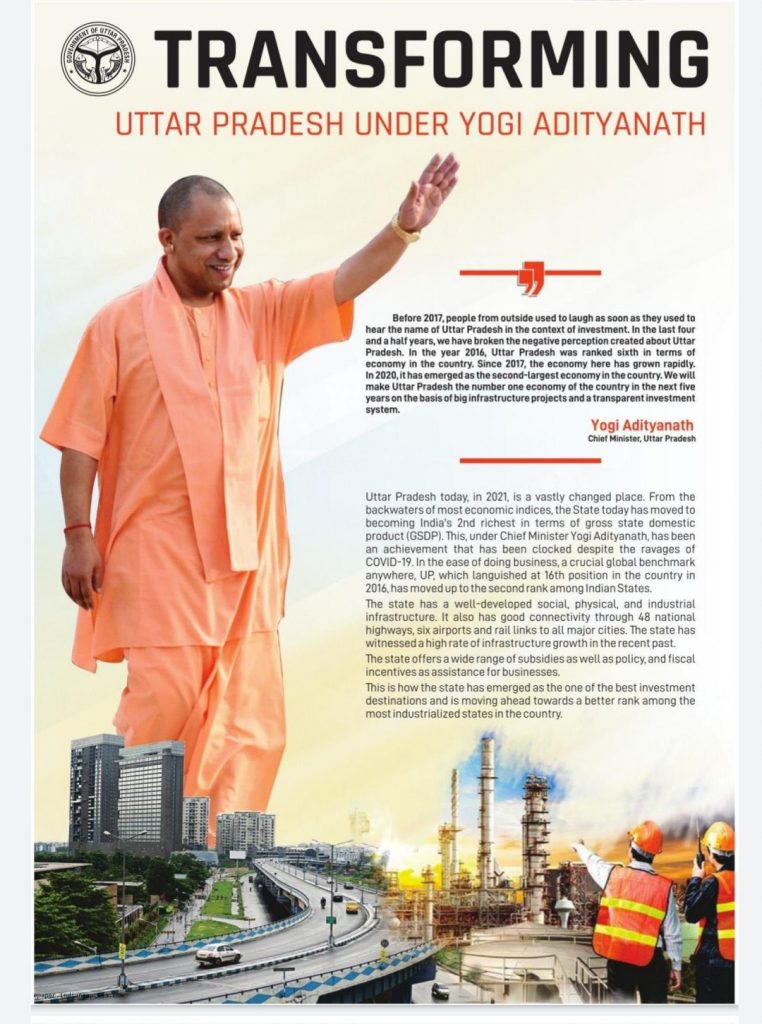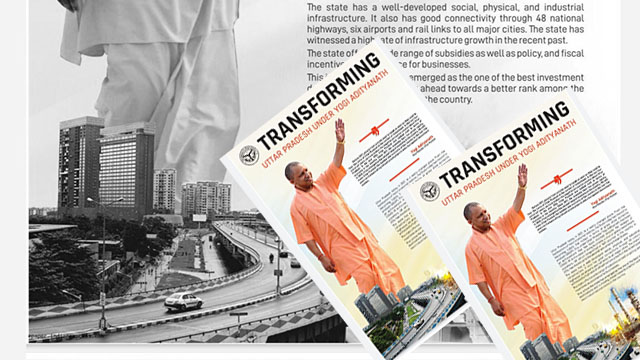Poll-bound Uttar Pradesh Chief Minister Yogi Adityanath has found himself in an embarrassing situation after a full-page “transformation” advertisement published by his government on the front page of several editions of The Indian Express on September 12th 2021 used the photograph of Kolkata’s iconic Maa Flyover to portray the purported development taking place in his state. The photograph that also shows several famous buildings in Kolkata and a quintessential yellow taxi, was taken off from all the digital editions of The Indian Express later.

India’s ruling Bharatiya Janata Party (BJP) and Prime Minister Narendra Modi’s government are infamous for peddling fake news. Several times in the past, Mr Modi and his cabinet ministers have been caught red-handed on social media posting fake claims and using fake images. Nearly, 18,000 accounts spread fake news for the BJP round the clock on social media. It’s not surprising to see Yogi following his boss’s legacy. The BJP government in Uttar Pradesh has been simply following the template set by the Modi-led Union government.
It’d have not been a piece of news—due to the banal nature of the plagiarism— if the flow of events had stopped at the publication of the advertisement. It was only when, surprisingly, The Indian Express tendered an apology for the gaffe, that a massive controversy was stirred.
“A wrong image was inadvertently included in the cover collage of the advertorial on Uttar Pradesh produced by the marketing department of the newspaper. The error is deeply regretted and the image has been removed in all digital editions of the paper,” The Indian Express tweeted. The term ‘advertorial’, which is different from advertisement, brought out a different angle to the issue.
While the netizens criticised The Indian Express of showing cowardice instead of ‘courage’, which it proudly proclaims in its tagline, for apologising for the content that is typically provided by the ‘client’, ie, one who intends to get an advertisement published in a newspaper, they didn’t notice the message delivered by The Indian Express, which didn’t use the term “advertisement”. In the newspaper business, the publisher is never responsible for the content of the advertisement, though it won’t publish advertisements that are prohibited by the law. The Indian Express also says so.
The second point of The Indian Express’s “Rules & Regulations” (For Acceptance of Release Order & Cancellation of Advertisements) specifically mentions that “We, our directors & employees shall stand indemnified against claims, demands, proceedings, etc arising directly or indirectly from the publication or non-publication of an advertisement and content thereof.” This means the newspaper can’t be held liable for the content published. Only the advertiser can be held liable.
In the third point under the “Advertisement Material” rules, The Indian Express has clearly stated that “The responsibility of providing the ad material remains with the agency / client who place (sic) the booking for an advertisement.” This means, The Indian Express isn’t responsible or involved in creating the content or designing the advertisement for the ‘client’, rather it’s the latter’s responsibility. In a perfect situation, someone from the Yogi regime or an agency hired by it would’ve provided the advertisement content for publication and the newspaper would’ve obliged the ‘client’ by publishing the content. But why the newspaper is apologising then?
In its tweet, The Indian Express used the term advertorial, rather than advertisement – the commonly-understood term. What’s an advertorial and what’s its significance?
The dictionary defines an advertorial as “a newspaper or magazine advertisement giving information about a product in the style of an editorial or objective journalistic article.” It means, the advertorial is camouflaged as a genuine article in the publication, but it must, therefore, contain a statutory label stating that it’s an advertorial that intends to promote a particular product or service or concept.
Surprisingly, the Yogi regime’s ‘transformation’ ad with Kolkata’s famous Maa Flyover’s photo, didn’t contain the label of an advertorial. However, unlike a typical front-page government advertisement, which is published simultaneously on the front pages of most newspapers of a certain city or major national dailies, this advertisement was only published in The Indian Express, across editions. This means, it was curated exclusively for The Indian Express, which is why no other publication had it in the first place.
In this scenario, if the marketing team of The Indian Express is responsible for the creation of the advertisement, rather than an agency, then it’s, of course, the newspaper’s responsibility to apologise for misusing the picture from Kolkata. However, if that’s the case, then a bigger problem is on the canvass. Can a newspaper maintain its political ‘neutrality’, its editorial ‘independence’, if its marketing team goes out to collaborate with the government and the ruling party?
The Indian Express’s marketing team’s involvement in creating advertorials for the Yogi regime also highlights the sheer financial crisis that has crippled the print media. Though the digital outlets of the traditional print media houses are making enough money from their high-traffic websites and online memberships, the print versions are supported through cross-subsidies.
Ads are important for the survival of the newspapers, however, when the newspaper will have to depend on a collaboration with a government, which it should hold accountable, then it will, gradually, must lose its editorial ‘freedom’ to become pragmatic and financially viable. The Indian Express must ask itself whether Ramnath Goenka, the paper’s Gandhian founder, would’ve approved this level of collaboration with a tyrannical regime headed by a communal rabble-rouser just because it will bring the house some hard cash during rainy days?
Unsigned articles of People's Review are fruit of the collective wisdom of their writers and the editors; these articles provide ultimate insight into politics, economy, society and world affairs. The editorial freedom enjoyed by the unsigned articles are unmatchable. For any assistance, send an email to write2us@peoplesreview.in

